HackUTD’17 Motivates 500 Students For 24 Hours With Big Ideas, Virtual Reality, Creativity, And Design
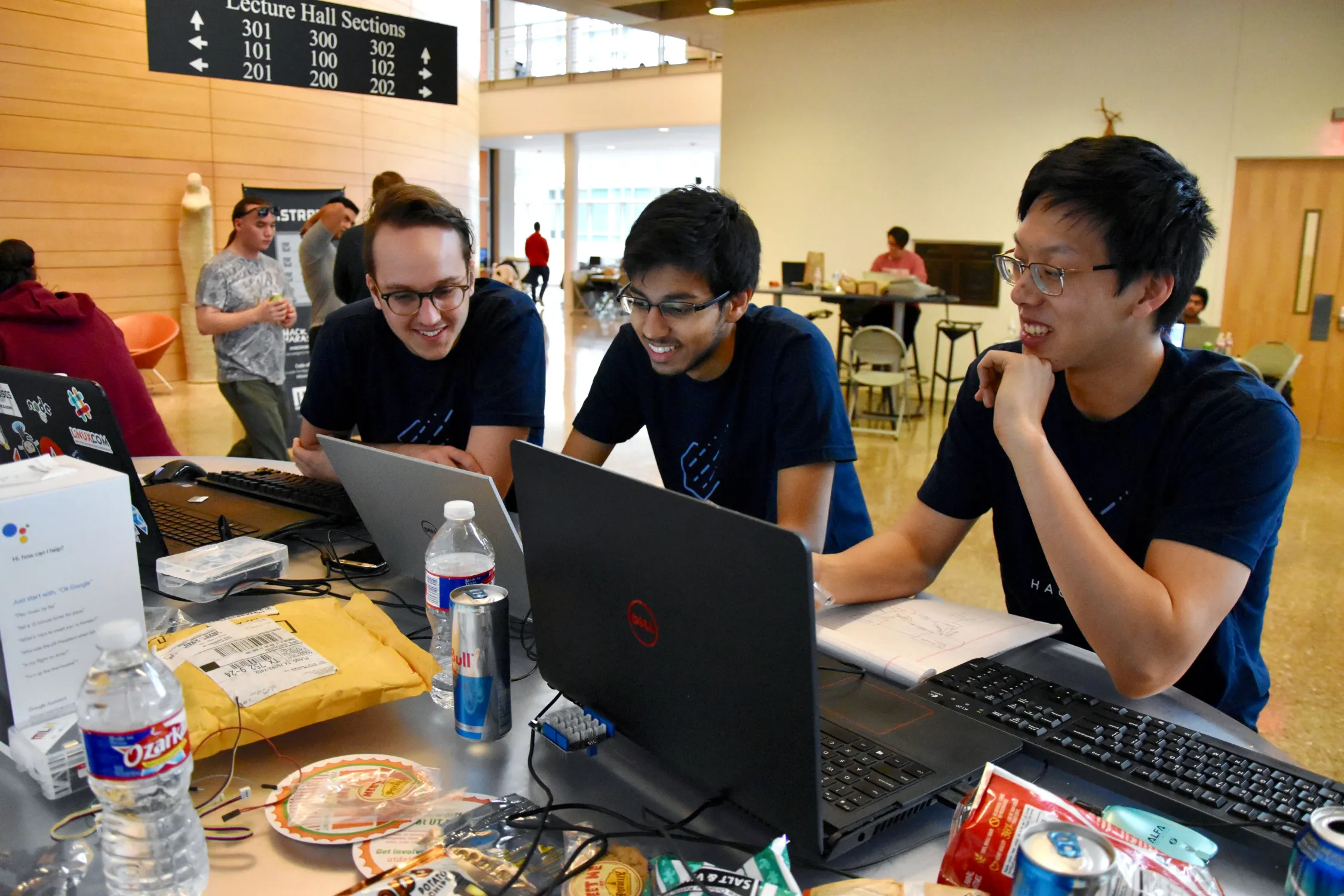
The Third Annual HackUTD 24-hour hackathon was held March 4th and 5th with approximately 500 students participating from all over the nation. The HackUTD event was organized by the UT Dallas Student Chapter of the ACM (Association for Computer Machinery) under the guidance of UT Dallas CS Professor, John Cole, with the goal of bringing together young coders to challenge them to design and develop an original piece of software utilizing their knowledge and skills that they have accumulated over the years. This year’s projects ranged from a virtual reality multiplayer sword fighting game, to a computer generated Theremin that played real violin sounds based on leap motion, to an electric pot stirrer with thermal monitoring controlled by an IOS App, to a homework assistant.
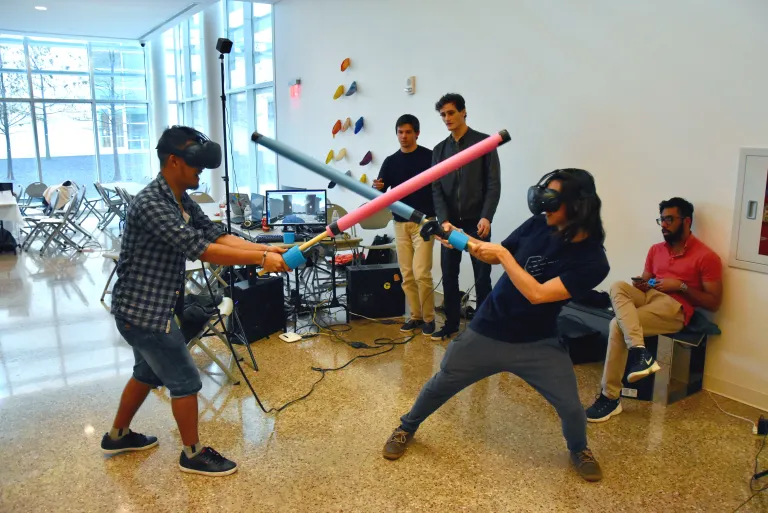
As the only major collegiate hackathon hosted in the Dallas/Fort Worth area, HackUTD has become the largest university hackathon in North Texas, attracting the very best students not only from Texas but from around the nation, as well as bringing in big time tech sponsors such as Walmart Technology, Wolters Kluwer, Raytheon, Make School, Raytheon, New York Life, and State Farm to interact with the students.
The Hackathon began with a keynote talk by Professor Gopal Gupta, Head of Computer Science, who underscored the importance of learning both theory and practice as a student of computer science. He urged every student to have at least one app on an app store by the time of graduation. The students officially began working on their respective projects at noon, Saturday, following a registration and opening ceremonies. A short 24 hours later the hackathon had come to a close with 500 tired students and 48 completed projects ready to be judged. Students competed in tracks within specific categories and were judged on the basis of their mobile, design, and hardware attributes, and if their project fit into multiple categories, they were eligible to be judged within multiple tracks. In addition to traditional prizes for top projects, students were able to compete in subcategories specific to their project’s area of specialization such as design, mobile, and hardware. Several of the industry sponsors also offered prizes in their own categories including Quantopian Stock Challenge, Amazon Web Services – Best Use of AWS, #HackHarrasment, and Best Domain Name from Domain.com.
One of the key aspects that makes HackUTD such a successful event every year is the interaction between the students, sponsors, and industry mentors. While coding their apps, attendees were free to network with company representatives—dozen of whom were at hand—-and get mentoring for their projects. The Major League Hacking (MLH) organization sponsored equipment rentals for the event. Attendees were able to utilize equipment such as KinectDeveloper Bundles, Windows IoT Developer Packages, and a 3D printer. To give the students breaks from their projects, the ACM provided students with the opportunity to attend various events hosted by the hackathons industry sponsors. These sponsored events included a Quantopian Talk and Challenge, Wolters Kluwer Tech Talk, State Farm Workshop, Make School iOS Workshop, HTC Vive Tech Demo, and Smash Bros. Tournament. We spoke to Yorlynn Engmann, Director of HackUTD’17, about the success of this year’s hackathon, “I am so pleased with how great HackUTD’17 went and how much of a giant success it was! We had so many talented participants and amazing projects. I am so grateful that I was able to be a part of such a large-scale event that is filled to the brim with so much innovation, energy, and creativity. I could not have done it without my hardworking team.” The event had fifteen HackUTD ACM Organizers and thirty volunteers.
By the end of the 24 hours, at noon on Sunday, a total of 48 completed projects were submitted. The projects were judged on the basis of their uniqueness, complexity, and impact factor. Prizes for the awards totaled $11,120. Tech industry members from Walmart, State Farm, Wolters Kluwer, and Raytheon were amongst the judges. Once the top five projects were selected a panel of judges consisting of Mr. Izuchukwu Elechi, Co-Founder of HackUTD and a Former President of the UT Dallas ACM, Diem-Nhi Tran, Co-Founder of HackUTD, Zakariya Ahmed a Former Vice President of the UT Dallas ACM, and Bryan Chambers, Director at Blackstone LaunchPad, selected the winner, the runner-up and the second runner-up.
The following are brief descriptions of first, second, and third place winning projects of HackUTD’17:
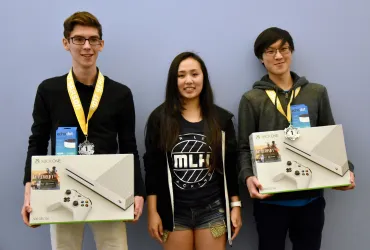
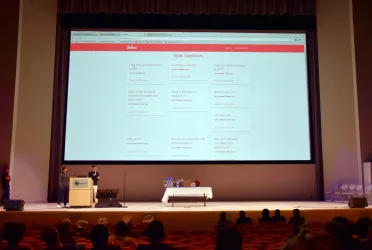
- First Place: Julian – Julian is a tutoring platform that rapidly connects students to qualified tutors over text. Users simply text (508) 444-9679 or provide their phone number on the website. Once a user has asked a question over text, tutors can see it in their dashboard, claim the question, and answer it. The app automatically handles keeping track of the question in the database and texting the user once their question has been answered.
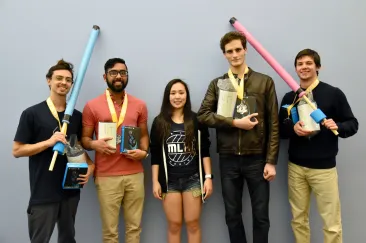
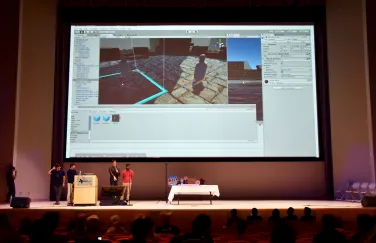
- Second Place: SwordzVR – A multiplayer virtual reality experience where two players can sword fight each other in the same virtual space.
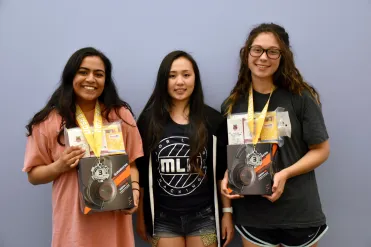
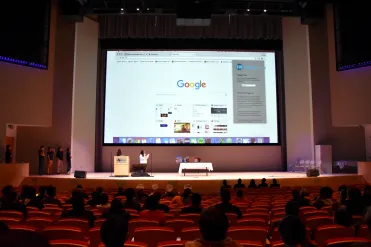
- Third Place: Untriggered – A Google Chrome extension where the user inputs certain words or phrases that may be triggers for them. Untriggered scans each page the user visits and warns the user of a potential trigger before the user can view the page. Ultimately, the user can decide whether they want to continue onto the page or not. This way the user has full control of their online experience
Additional awards in subcategories were presented as well, these included:
- Mobile Track – Holy Stone HS170 Predator Mini RC Helicopter Drone $2000 Scholarship to Make School Summer iOS Program – SensorStrike – This app allows the user to emulate keyboard strokes and mouse clicks with their smartphone. By using the orientation sensor on the phone, the team was able to control the mouse cursor with a mobile phone. For this Hackathon, they have specifically tailored their app for CS:GO. This will enhance the gaming experience for pros and beginners alike.
- Design Track – Huion Graphics Tablet – DJCollab – DJCollab uses an iOS mobile application as well as a web client to interact with the system to add songs from multiple users within a “party” to queue up songs and keep the party going.
- Hardware Track – TI Launchpad Kits – Watchpot – An electric pot stirrer with thermal monitoring controllable by an IOS App
- Amazon Web Services – Best Use of AWS – $250 AWS Credit – Julian – Julian is a tutoring platform that rapidly connects students to qualified tutors over text.
- #HackHarrasment – Use your tech skills for good and hack online harassment. Build a software solution that can help reduce the frequency and/or severity of online harassment. Win HackHarassment Power Bank.
- Best Domain Name from Domain.com. – Domain.com Swag Bags – Junk Monkey – Blockchain based trash collection app.
You can view all the submissions here.
Partners for HackUTD’17 included, Major League Hacking (MLH), Quantopian, Namecheap, PolyPrinter, the UT Dallas Virtual Reality Society (VRS), and Makerspace.
Click here to view all the photos from the event.
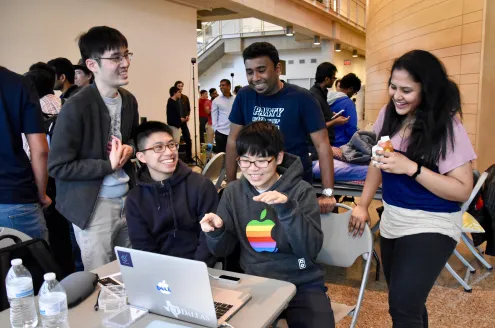
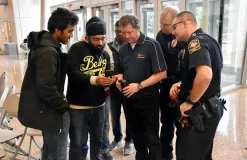
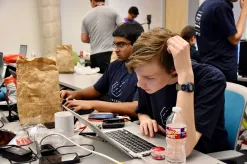
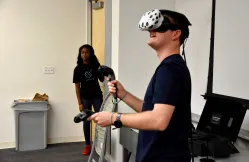
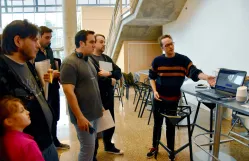
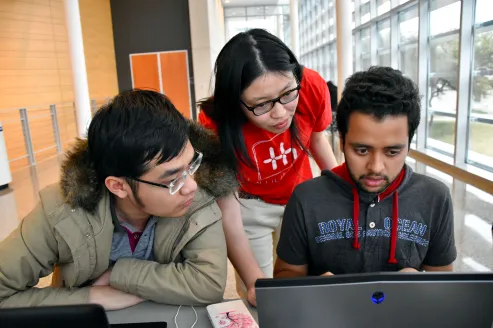
ABOUT THE UT DALLAS COMPUTER SCIENCE DEPARTMENT
The UT Dallas Computer Science program is one of the largest Computer Science departments in the United States with over 2,100 bachelor’s-degree students, more than 1,000 MS master’s students, 150 PhD students, and 86 faculty members, as of Fall 2016. With The University of Texas at Dallas’ unique history of starting as a graduate institution first, the CS Department is built on a legacy of valuing innovative research and providing advanced training for software engineers and computer scientists.




